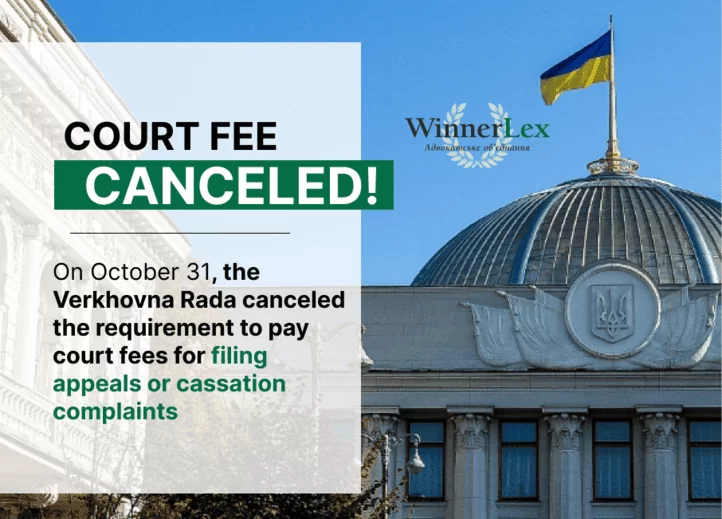Appeals and Cassation Complaints in Civil Cases Can Now Be Filed Without Paying Court Fees
06.11.2024

On October 31, the Verkhovna Rada finally passed a law canceling the requirement to pay court fees for filing appeals or cassation complaints against rulings in cases challenging the decisions, actions, or inactions of a state or private bailiff during the enforcement of court decisions in civil cases.
Interestingly, these changes were introduced in response to the Constitutional Court’s ruling on May 13, 2024, in a case regarding the enforceability of court decisions based on a constitutional complaint filed by an individual.
The Case That Started It All
Back in 2013, there was a case in which an individual received a court ruling and an enforcement order to recover funds from a debtor, but the decision was never enforced. The citizen’s attempt to challenge the inaction of the state bailiff was also unsuccessful, as the court of first instance deemed the deadline for filing the complaint had expired, and the appellate and cassation courts refused to consider the complaint without the payment of a court fee, as required by the Civil Procedure Code.
Thus, the applicant appealed to the Constitutional Court, arguing that the provisions of the Law on Court Fees violated his right to judicial protection and the right to appeal decisions, actions, or inactions of state or local authorities, officials, and failed to ensure the state’s obligation to enforce court decisions and supervise their enforcement.
Constitutional Court’s Conclusions on the Complaint
While examining the complaint, the Constitutional Court of Ukraine concluded that there was an unjustified interference with the creditor’s right to access the court, as a person who has already paid a court fee to file a claim, accessed the court, and obtained a binding decision in his favor is then required to pay an additional (secondary) court fee to enforce judicial oversight over the implementation of that decision.
This case highlights that, in this instance, the state did not create adequate legal mechanisms for realizing the right to court access, nor did it provide effective judicial oversight at the enforcement stage of the court decision. This complication in realizing a person’s right to court access (the creditor in the enforcement proceeding) constitutes a violation of constitutional principles of judicial proceedings and civil procedural law.
The Constitutional Court also noted that the legislature did not act in accordance with the principles of fairness, reasonableness, proportionality, or balance between the state’s interest in collecting court fees and the individual’s interest in accessing the court and enforcing the court decision. The legislature also failed to achieve the primary purpose of justice—protecting rights and freedoms.
Following the review of the individual`s constitutional complaint, the Constitutional Court declared unconstitutional the provisions of the Law on Court Fees that mandated the payment of court fees for filing appeals and cassation complaints against court rulings in cases challenging decisions, actions, or inactions during the enforcement of court decisions in civil cases. This decision also obligated the Verkhovna Rada to bring the relevant legal regulations in line with the Constitution of Ukraine and this Court ruling.
The Effectiveness of the Constitutional Complaint
The Constitutional Court’s decision and the resulting legislative changes serve as an example of the effectiveness of the citizen’s constitutional complaint mechanism.
In response to the Constitutional Court’s conclusions, the state removed obstacles to citizens’ right to access the court and enhanced the effectiveness of judicial oversight over the enforcement of court decisions.
The conclusions in the reasoning part of the decision will undoubtedly be used by legal professionals in cases concerning the principle of enforceability of court decisions.
